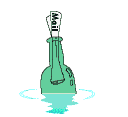SAY DEQ EMPLOYEES.
LAX ENFORCEMENT; 80 % OF VIOLATIONS IGNORED


For Immediate Release: Thursday, September 24,1998 Contact: Rob Perks (202)265-7337.
Washington, D. C...Public Employees for Environmental Responsibility (PEER) today released a white paper written by employees within the Michigan Department of Environmental Quality (DEQ) detailing how the very agency charged with protecting Michigan's diminishing wetlands has aided in their illegal destruction, primarily by undermining essential law enforcement.
In Michigan, thousands of environmentally sensitive acres of Great Lakes shorelines, inland lakes and streams are being developed at a rapid pace. Meanwhile, hundreds of citizen complaints of wetlands violations are ignored by DEQ or never even entered into the agency's computer tracking system. An estimated 80 percent of all registered complaints are simply closed without investigation.
"Michigan's wetland regulatory program had long been touted as one of the best in the country. According to DEQ employees, the program is now just a shadow of its former self -- a paper tiger," stated PEER National Field Director Rob Perks. "The less than six million acres of remaining wetlands in the state are jeopardized by poor management based on politics, not science or the law."
The PEER report, entitled SEE NO EVIL: The Gutting of Michigan's Wetlands Protections, traces how, under the Engler Administration, the DEQ has systematically undermined the state's once-solid wetland protection program by gutting wetland compliance efforts, diluting permit standards, intimidating staff to issue questionable permits and discouraging any attempts at law enforcement:
"Since the creation of DEQ three years ago, efforts to protect wetlands have been systematically undercut. Employees have been pressured to issue development permits and to ignore violations," commented Perks. "As a result, a generation of wetlands protection in Michigan's wetlands has been largely dismantled through policies instituted by appointees of Governor John Engler."
Copies of See No Evil are available upon request. PEER is a national alliance of state and federal employees working within pollution control, land management and wildlife protection agencies. Based in Washington, D.C. and with a network of field offices from California to Florida, PEER is working in twenty states and nearly a dozen federal agencies to promote environmental ethics and governmental accountability.
Dave Dempsey
Policy Director
Michigan Environmental Council
119 Pere Marquette, Suite 2A
Lansing, MI 48912
davemec@voyager.net
Michigan Environmental Council

|
Thornapple Wetlands
 |
